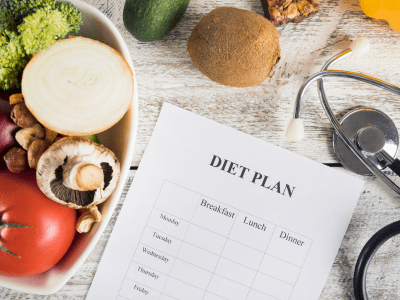Transform Your Body: Choosing the Best Diet Plans for Effective Weight Management

- Posted by
 Prachi Shah
Prachi Shah
You are not just your body you are your mind, your soul, your thoughts and so much more. So the food that you eat also has to nourish all of these things and so does your diet plan. If it’s depriving you of basic things it is not ideal.
A diet plan involves lot many things like your age, weight, height, gender, activity level, dietary preferences, and any specific health goals or dietary restrictions you may have. Hence while choosing a diet plan it is necessary to choose a plan that aligns with all the above points.
Your diet plan needs to be customized as per your needs because every body is different and following a generic plan might do more harm than benefit. Specially if you have a medical condition or some problem that might need additional attention.
There are endless number of diet plans in market for different reasons, some of them are as below:
-The Mediterranean diet
-The dash diet
-The plant based diet
-Intermittent fasting
-Low carb diets
-Keto diets
-Vegan diet
All these diet plans are restrictive in some form or the other. Like keto diets are restrictive of carbohydrates and focuses on fat while plant based diets focuses on plant based products, exclusive of eggs, seafood, meat. A vegan diet is restrictive of animal based products like milk, milk products and focuses only on plant based foods. A diet plan which is wholesome and sustainable is something to look forward to.
How does the diets work?

Diets work by influencing your overall energy balance, metabolism, and nutrient intake, which can, in turn, affect your weight, health, and well-being. The basic principle of most diets is to control the number and types of calories you consume, regulate macronutrient proportions, and make specific food choices to achieve specific health or weight-related goals.
Here are some key aspects of how diets generally work:
- Caloric Balance: Weight management is influenced by the balance between the calories you consume (through food and beverages) and the calories your body expends (through basal metabolic rate, physical activity, and other metabolic processes). If you consume more calories than your body needs, you gain weight; if you consume fewer, you lose weight.
- Macronutrient Composition: Different diets manipulate the proportion of macronutrients—carbohydrates, proteins, and fats—in varying ways. For example, low-carbohydrate diets like keto emphasise fat consumption for energy, while high-protein diets may prioritise protein intake to support muscle building and satiety.
- Nutrient Density: Many diets focus on nutrient-dense foods, such as fruits, vegetables, whole grains, and lean proteins. Nutrient-dense foods provide essential vitamins, minerals, and other beneficial compounds with fewer calories, promoting overall health and well-being.
- Meal Timing and Frequency: Some diets advocate specific meal timings or frequencies, such as intermittent fasting, which involves cycles of eating and fasting. These patterns can influence metabolic processes and may have effects on weight loss and other health markers.
- Behavioural Changes: Successful diets often require changes in eating behaviours and habits. This can include portion control, mindful eating, and addressing emotional or stress-related eating patterns.
- Hormonal Effects: Certain diets, such as low-carbohydrate or ketogenic diets, can influence hormone levels (e.g., insulin, ghrelin, leptin), affecting appetite, satiety, and fat metabolism.
- Individual Variation: Different individuals may respond differently to the same diet due to genetic factors, metabolic rate, lifestyle, and personal preferences. What works well for one person may not be suitable for another.
- Water and Fiber Intake: Diets often emphasise the importance of staying hydrated and consuming an adequate amount of dietary fiber. These elements contribute to a feeling of fullness, support digestion, and overall health.
- Short-Term vs. Long-Term Effects: Some diets may lead to rapid weight loss initially, but long-term success often depends on sustainable lifestyle changes. Crash diets or extreme restrictions are often difficult to maintain and majority result in the regain of lost weight.
- Health Goals and Conditions: Diets are often designed with specific health goals in mind, such as weight loss, improved blood sugar control, or better heart health. Some diets are also tailored to address certain medical conditions such as diabetes or hypertension or post cancer recovery.
What is a sustainable diet plan?

A sustainable diet plan focuses on nourishing your body with nutrient-dense foods while promoting long-term health, well-being, environmental sustainability and low impact on food supply. A sustainable plan takes into consideration the impact it will have on the environment, the individual, and the food chain as a whole. Factors that determine the sustainability of a certain diet include:
- nutritional availability
- relative cost
- biodiversity
- ecosystem protection
- general health
Considering all these factors should help ensure that the planet can continue providing enough food and resources for a growing population and future generations. Thus, plans that adhere to these points are more sustainable to follow and should be encouraged.
How to choose diet plan for your body?

- One that you will stick to: Choosing diet plans that you will stick to for a longer period of time is something you should consider. If you see yourself easily able to follow a certain pattern without any gaps or excuses it is in for you.
- It matches your physical activity levels: A plan that suggests you exercises that you are comfortable doing and know that you will continue is something to look for. Plans that need you to do extreme or very little form of exercise and mentions same kind of workouts can get monotonous. Exercise activities like dancing, Zumba, walking, etc that you enjoy doing is something you should look for.
- Sustainability: Sustainability ratio is the most important feature of any diet plan. When you ask yourself,” Will I be able to do this for the rest of my life?” And the answer is “Yes”, select it immediately. If you have doubts or think that after loosing weight you won’t continue, better to opt out of it because as soon as you stop following the plan you will come back to your original self be it losing weight or gaining weight.
- Foods included: Make sure you choose a diet plan that includes foods of your liking, availability and affordability. If there are things out of your budget and easy availability it is better to not indulge in the plan because it will not be comfortable in the longer run.
- How slowly you lose weight!: A safe place to lose weight is somewhere around 800 grams to 1 kg per week and the best way to achieve it is by burning about 500 calories per day through diet and exercise. If the diet plan is devoid of exercise and only claims to lose or maintain weight through eating calorie deficit food it is not a sustainable plan.
- Habit building: Look for a plan that helps you recognise your unhealthy habits which is keeping you from losing weight. Be it mindless munching, excessive alcohol, too much outside food indulgence, no routine. If the diet plan helps you recognise your unhealthy traits and helps you build a routine and lifestyle change in an easy doable way it is the right one for you.
- Structured or flexible: Depending on your choice you need to select if you are looking for something very structured and strict or you need flexibility in term so choosing and swapping your foods as per your liking. Some people prefer a diet plan that calls for specific foods and portion sizes to help them stay on track. Others like the flexibility of making their own food choices. As long as the diet plan includes a variety of healthy food- fruits, vegetables, beans, whole grains, low-fat dairy, and lean protein, either type can work.
- Do it yourself: If you don’t want to join a diet program you can simply plan your own routine by taking help of a dietician or nutritionist to plan a diet suited for your needs and body requirements.
Choosing a perfect diet plan is not the goal. You should focus on the progress rather than perfection. If a particular health program is suiting and ticking your boxes you can opt for it. The only thing to be aware of is that being healthy and maintaining it is a journey and not a one-off goal so be patient with yourself and don’t overdo anything.

